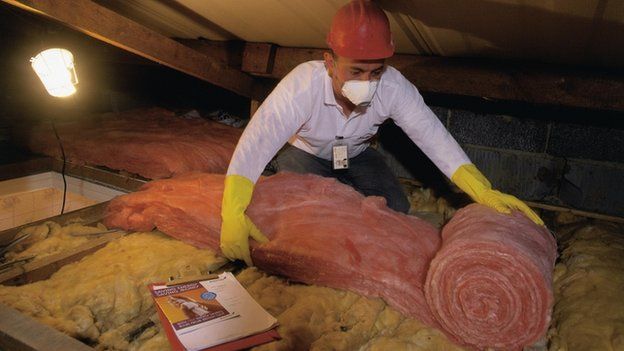Tackle cold homes, ministers told
- Published

Bringing the UK's ageing homes into the 21st century should be a key infrastructure priority, ministers have been told.
The government is consulting on a multi-billion pound plan for roads, rail, flood defences and energy.
But opposition parties and institutions have told BBC News that home energy efficiency is equally important.
Unless homes are insulated, they say the UK will miss targets to end fuel poverty and cut carbon emissions.
The plan to make home energy efficiency a key infrastructure priority was proposed by the right-leaning think-tank Policy Exchange (PX).
BBC News found wide support, including from Labour, Lib Dems, SNP, Plaid Cymru, the CBI, TUC, the union GMB, the left-leaning think-tank IPPR, the all-party parliamentary group Green Alliance, the World Energy Council, the Institution of Civil Engineering and leading energy academics.
'A no-brainer'
The government declined to comment but its advisory body the National Infrastructure Commission said it would consider whether to take the idea further.
PX argues that improving home efficiency creates many jobs; combats fuel poverty; reduces air pollution; minimises carbon emissions; cuts fuel imports; benefits the balance of payments; and reduces the need to build new power stations.
"It's pretty much a no-brainer," said Richard Howard of PX.
"Bringing people's homes up to standard is incredibly good value for money. We don't typically think of housing as infrastructure like we think of roads and railways - but we've got to change the way we approach this: housing is critical infrastructure."
The CBI's Rhian Kelly told BBC News: "Energy efficiency in homes and businesses is often at the back of the queue, so it's right that we see a sharper focus on making buildings more insulated, leading to significant savings for households and firms and important environmental benefits."
Professor Jim Watson, director of the UK Energy Research Centre, said: "For too long, there has been an assumption that infrastructure includes energy supply and energy networks, whereas the type and quantity of energy we use (and might need in future) is heavily dependent on infrastructures that use energy such as buildings, vehicles and appliances."
Christophe Frei, General Secretary of the World Energy Council, said: "This is such a no-brainer. It responds to energy efficiency, addressing fuel poverty, replacing new capacity requirement - and the financing is so much easier to do because the pay-back period is so short. But it needs the policies."
Among the organisations the BBC contacted, only the Institute for Economic Affairs did not back the plan, saying that using taxpayers' funds to improve housing was not a good use of public money.
Follow Roger on Twitter @rharrabin and Facebook https://www.facebook.com/roger.harrabin
- Published2 February 2016
- Published23 July 2015
- Published7 October 2014
- Published9 June 2014